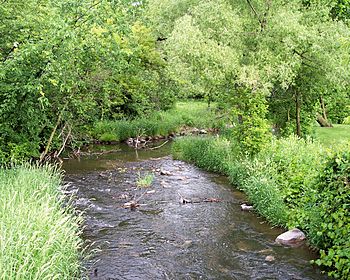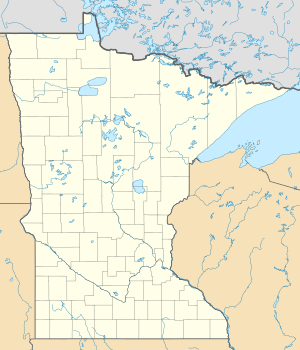Credit River (Minnesota) facts for kids
Quick facts for kids Credit River |
|
|---|---|

The Credit River in a city park in Savage in 2007
|
|
|
Location of the mouth of the Credit River in Savage, Minnesota
|
|
| Country | United States |
| State | Minnesota |
| Physical characteristics | |
| Main source | Elko New Market 1,129 ft (344 m) 44°34′13″N 93°20′13″W / 44.57028°N 93.33694°W |
| River mouth | Minnesota River Savage 697 ft (212 m) 44°47′14″N 93°20′32″W / 44.78722°N 93.34222°W |
| Length | 21.5 mi (34.6 km) |
| Basin features | |
| Basin size | 46.3 sq mi (120 km2) |
The Credit River is a small river in Minnesota, United States. It's about 22 miles (35 km) long. This river flows into the Minnesota River.
The Credit River is part of a larger watershed. This means all the rain and snow that falls in its area eventually flows into the river. The Credit River's water then joins the Minnesota River, which flows into the mighty Mississippi River.
Contents
Where the Credit River Flows
The Credit River starts from a small lake. This lake is located in the city of Elko New Market. This city is in southeastern Scott County.
Journey Through Scott County
From its start, the river flows generally north. It passes through a few different areas. These include the townships of New Market and Credit River.
Reaching the Minnesota River
Finally, the Credit River reaches the city of Savage. Here, it flows into the Minnesota River from the south. This meeting point is about 14 miles (22 km) south-southwest of downtown Minneapolis.
River Health and Water Quality
Rivers are important for nature and people. Keeping them clean and healthy is a big job. Sometimes, rivers can have problems with their water quality.
Understanding Turbidity
In 2002, the Minnesota Pollution Control Agency looked at the Credit River. They found it had a problem called "turbidity." Turbidity means the water was cloudy or murky. This cloudiness is usually caused by tiny bits of soil or other materials floating in the water.
Improving River Conditions
Cloudy water can be bad for fish and other river life. It can block sunlight, which plants need to grow. However, the Credit River's water quality improved! In 2012, the agency checked the river again. New information from 2008–2009 showed that the water was no longer too cloudy. This meant the river was healthier.
 | George Robert Carruthers |
 | Patricia Bath |
 | Jan Ernst Matzeliger |
 | Alexander Miles |


